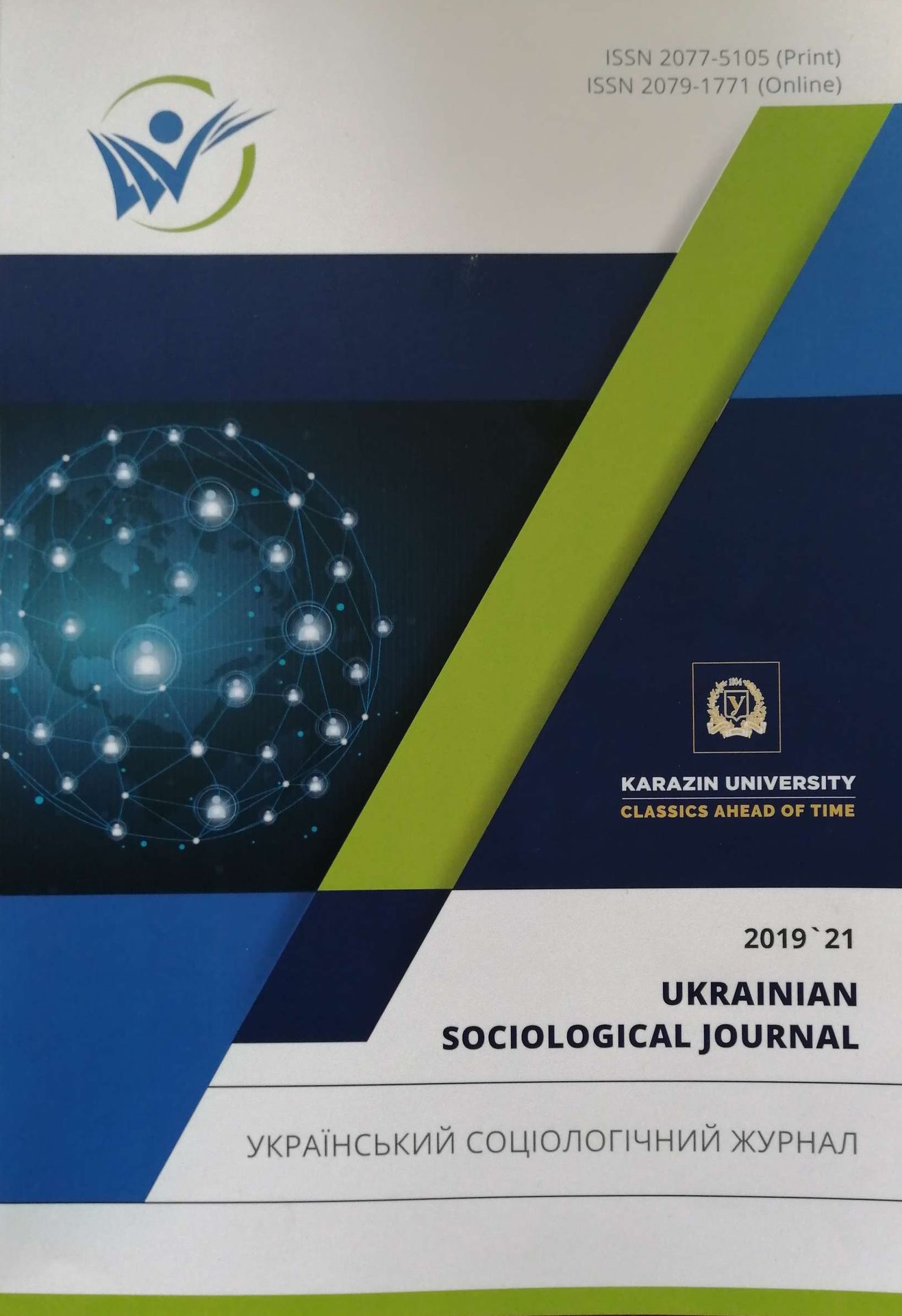Decentralization reform in assessments of united territorial communities (hromadas) leaders’: new dimensions of social subjectiveness
Abstract
The article is dedicated to studying of the social nature peculiarities of the new social entity that emerged due to the implementation of the decentralization reform in Ukraine – the united territorial communities (UTC). On the level of sociological theorizing, the authors substantiate the relevance of the «sociological positioning» of the united territorial communities as a new social institution, a new social entity and a new sociocultural form. Based on the results of sociological research with the qualitative methods, the authors distinguish three dimensions / levels of social subjectiveness of the leaders of the united territorial communities as the main representatives of community management – institutional, civic and problem-oriented. Having value and activity-based nature, each of the dimensions of social subjectiveness identified by the researchers finds its manifestation at the dispositional and actualized levels. Particular attention is paid to the analysis of factors that, due to researchers’ beliefs, have influenced on the formation of certain dimensions / levels of subjectiveness of UTC leaders – a voluntary (not administrative) way of community association, new financial opportunities and a direct state-community interaction model. It is emphasized that the united territorial community is simultaneously directly embedded in the system of direct social interactions at different levels of social – from interaction with the state (Ministries) at the macro level, construction of practices at the level of interaction with different social groups (businessmen, farmers, state employees, etc.) at the mesolevel before reaching the micro-level of individual interaction within the community itself. Analyzing the results of this study, the researchers conclude that the decentralization reform has contributed to the internal consolidation of local communities at the level of united territorial communities, the intensification of social interaction between different subjects of the UTC, the formation of new sociocultural forms. The analysis of the dimensions / levels of social subjectiveness of the UTC leaders makes it possible to conclude the positioning of the united territorial communities as effective subjects implementation of other reforms in Ukraine at the regional level.
Downloads
References
Європейська хартія місцевого самоврядування: офіційний переклад. URL: https://zakon.rada.gov.ua/laws/ show/994_036 (дата звернення 22.05.2019).
Ткачук А.Ф.Від перспективного плану до стратегії розвитку громади (через призму досвіду об‘єднаних територіальних громад Хмельниччини) К.: ТОВ «Видавництво «ЮСТОН», 2018. 76 с.
Про схвалення Концепції реформування місцевого самоврядування та територіальної організації влади в Україні: Розпорядження Кабінету Міністрів України від 1 квітня 2014 р. № 333-р. URL: https://zakon5.rada.gov.ua/laws/ show/333-2014-%D1%80 (дата звернення 05.11.2018).
Ядов В.А. Личность как объект и субъект социальных отношений. Социология и современность Т. 1. М.: Наука, 1977. С. 380-392.
Сокурянська Л. Г. Проблема субъекта в современной социологии. Вісник ХНУ імені В. Н. Каразіна. Серія «Соціологічні дослідження сучасного суспільства: методологія, теорія, методи». Харків: ВЦ ХНУ імені В. Н. Каразіна, 2003. №577’2003. С. 24–30.
Сокурянская Л. Г. Студенчество на пути к другому обществу : ценностный дискурс перехода: монография. Харьков: Харьковский национальный университет имени В.Н. Каразина, 2006. 576 с.
Сокурянська Л. Г. Суб’єкт помер!? Хай живе суб’єкт! Соціологія у пошуках втраченого суб’єкта. Вісник Львівського університету. Серія соціологічна. Львів: Льв.ун–т імені І. Франка, 2008. Вип.2. С. 18–31
Децентралізація влади: порядок денний на середньострокову перспективу: аналітична доповідь / Жаліло Я. А., Шевченко О.В., Романова В. В. та ін. Національний інститут стратегічних досліджень. К.: 2019. 115с.
Гончаренко М. В. «Механізми формування фінансових ресурсів територіальнихгромад в умовах децентралізаці», 2017. URL: http://www.kbuapa.kharkov.ua/ebook/apdu/2017-2/doc/2/03.pdf
Моніторинг процесу децентралізації влади та реформування місцевого самоврядування. URL: https:// decentralization.gov.ua/mainmonitoring
Ионин Л. Г. Социология культуры: путь в новое тысячелетие: учеб. пособие для студентов вузов. 3-е изд., перераб. и доп. М.: Логос, 2000. 431 с.
Штомпка П. Социология социальных изменений / под ред. проф. В.А. Ядова; пер. с англ. М.: Аспект-Пресс, 1996. 414 с.
Децентралізація та реформа місцевого самоврядування: результати четвертої хвилі соціологічного дослідження: аналітичний звіт. URL: https://www.kiis.com.ua/ materials/pr/20191103_decentralisation/decentr_ukr




